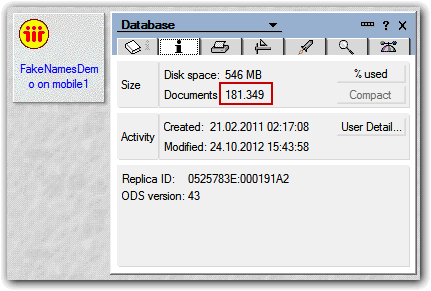Experimenting DOTS task vs. Java Agent
DOTS (Domino OSGi Tasklet Service) project has been contributed into OpenNTF last year. Basically, it provides a way to create server tasks for Java developers.
This is huge. Basically we could run our Java code in a similar way with a couple of other techniques, but DOTS provide many advantages. I'll dive deep on this in a seperate blog post. For now, take it as a teaser :)
You can refer to Niklas's blog entry to setup DOTS in your environment.
For this experiment, I'm using an exploded version of FakeNames database by David Leedy. In the past, I have duplicated all contents for several times and I'm still using it to crash my server :)
First, I have created a 'terrible ' Java agent which does nothing.
import java.util.Date;
import lotus.domino.AgentBase;
import lotus.domino.AgentContext;
import lotus.domino.Database;
import lotus.domino.Document;
import lotus.domino.NotesException;
import lotus.domino.Session;
import lotus.domino.View;
public class JavaAgent extends AgentBase {
public void NotesMain() {
try {
Session session = getSession();
AgentContext agentContext = session.getAgentContext();
Date startTime=new Date();
Database db=getSession().getDatabase("", "test/fakenames.nsf", false);
longJob(db);
long duration=((new Date().getTime()) - startTime.getTime())/1000;
System.out.println("Finished in " + String.valueOf(duration) + " secs... - ");
} catch(Exception e) {
e.printStackTrace();
}
}
public void longJob(Database db) throws NotesException {
int count=0;
View view=db.getView("byName");
System.out.println(view.getTopLevelEntryCount());
for(int i=0; i < view.getTopLevelEntryCount(); i++) {
Document doc=view.getNthDocument(i);
if(doc!=null) {
if(doc.getItemValueString("FirstName").startsWith("Sa")) {
count++;
}
doc.recycle();
}
}
view.recycle();
System.out.println(count);
}
}
As I said before, it does nothing but counting people that has a first name starts with "Sa". So it does something, consume memory and CPU. Who cares :)
Then I implemented the same code as a DOTS task:
import java.util.Date;
import lotus.domino.Database;
import lotus.domino.Document;
import lotus.domino.NotesException;
import lotus.domino.View;
import org.eclipse.core.runtime.IProgressMonitor;
import com.ibm.dots.annotation.RunOnStart;
import com.ibm.dots.task.AbstractServerTaskExt;
import com.ibm.dots.task.RunWhen;
public class AnnotatedTasklet extends AbstractServerTaskExt {
public AnnotatedTasklet() {
}
public void dispose() throws NotesException {
}
@Override
protected void doRun(RunWhen runWhen, IProgressMonitor monitor) throws NotesException {
}
@RunOnStart
public void runOnStart( IProgressMonitor monitor ) throws NotesException {
Date startTime=new Date();
Database db=getSession().getDatabase("", "test/fakenames.nsf", false);
longJob(db);
long duration=((new Date().getTime()) - startTime.getTime())/1000;
logMessage("Finished in " + String.valueOf(duration) + " secs...");
}
public void longJob(Database db) throws NotesException {
int count=0;
View view=db.getView("byName");
System.out.println(view.getTopLevelEntryCount());
for(int i=0; i < view.getTopLevelEntryCount(); i++) {
Document doc=view.getNthDocument(i);
if(doc!=null) {
if(doc.getItemValueString("FirstName").startsWith("Sa")) {
count++;
}
doc.recycle();
}
}
view.recycle();
System.out.println(count);
}
}
Now, results:
> tell amgr run "test\XPagescrash.nsf" 'LongJobAgent'
09.11.2012 19:38:39 JVM: Java Virtual Machine initialized.
09.11.2012 19:38:39 AMgr: Start executing agent 'LongJobAgent' in 'test\XPagescrash.nsf'
09.11.2012 19:38:39 Agent Manager: Agent printing: 181349
09.11.2012 19:41:02 Agent Manager: Agent printing: 2227
09.11.2012 19:41:02 Agent Manager: Agent printing: Finished in 143 secs... -
09.11.2012 19:41:02 AMgr: Agent 'LongJobAgent' in 'test\XPagescrash.nsf' completed execution
> load dots
> Listening for transport dt_socket at address: 8001
> WARNING: Using pde configuration New_configuration located in C:\Lotus\Domino\Data\domino\workspace-dots\pde.launch.ini
09.11.2012 19:42:40 Domino OSGi Tasklet Container started ( profile DOTS )
> 181349
> 2227
09.11.2012 19:43:22 [DOTS] (annotated) Finished in 41 secs...
You got the idea. The same Java routine runs in 143 seconds as a Java agent and 41 seconds as a DOTS task *.
(*) Clinical trials from Developi labs :)
